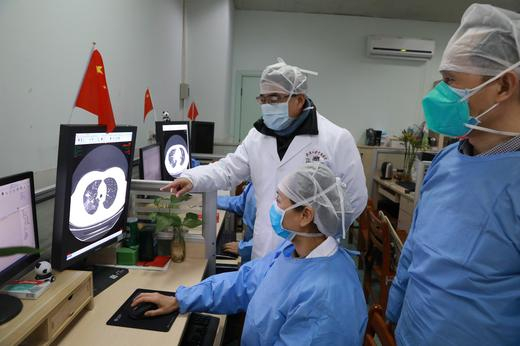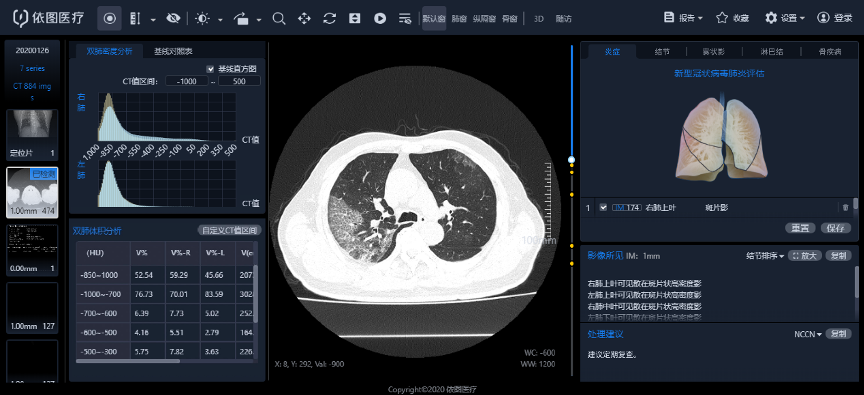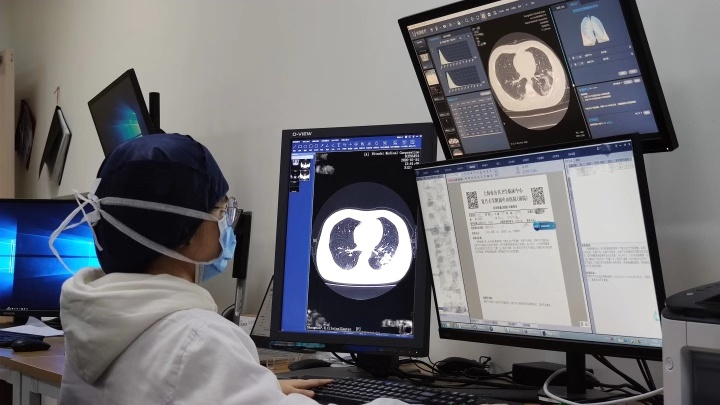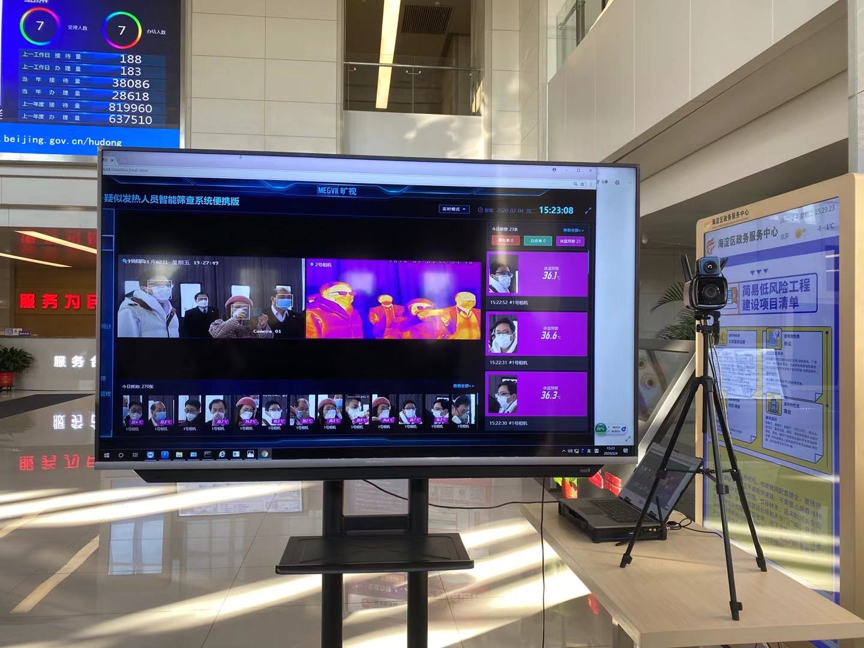On Thursday, the number of confirmed coronavirus cases in Hubei, the epicenter of the outbreak, surged to 14,840, the province's national health commission said in a statement.
This is due to a change in diagnostic methods, as the commission began including people that were confirmed through computerized tomography (CT) scan results.
Previously, only patients that were tested positive in nucleic-acid tests were considered confirmed cases. But due to a shortage of testing kits and reports of unreliable test results, doctors have been proposing that they should first use CT scans to detect patients of pneumonia and isolate them as quickly as possible.
But even that presents mounting challenges for hospitals overwhelmed with patients in Wuhan. There are simply too many CT scan images for doctors to examine.

Medical workers inspect the CT scan image of a patient at the Zhongnan Hospital of Wuhan University, February 2, 2020. /Reuters Photo
Medical workers inspect the CT scan image of a patient at the Zhongnan Hospital of Wuhan University, February 2, 2020. /Reuters Photo
Amid diagnostic challenges, Chinese Artificial Intelligence (AI) companies are racing to offer their help.
Scientists noted that most coronavirus patients had abnormal findings on their chest scans, according to a Lancet study published on January 24. While early-stage patients have chest scans characterized by white patches in the lower corners of the lungs - what radiologists call ground-glass opacities - late-stage patients had whole-lung infection that made their lungs look almost completely white in their scans.
As these ground-glass opacities are widely distributed, evaluating the cumulative volume, and severity of them in the lungs is of vital importance.

A CT scan image of the lungs of a suspected coronavirus patient. /Reuters Photo
A CT scan image of the lungs of a suspected coronavirus patient. /Reuters Photo
YITU Technology, a leading Chinese AI company, has rolled out an AI-powered screening and diagnosis platform. According to Vice President at YITU Healthcare, Fang Cong, the system can automatically run tests on coronavirus-affected areas in the lungs and classify patients by virus severity so that corresponding treatment options can be given.
The entire process takes about two-three seconds, a sharp reduction in time compared with the five to six hours a doctor spends on analyzing the infection through manual process. Although the system itself cannot give a clear diagnosis, it can assist doctors in making a diagnostic decision, Fang told CGTN.
However, the system still faces great challenges in dealing with coronavirus. According to Fang, the irregular shape of ground-glass opacities and their unclear boundaries have made clinical evaluation very difficult. On top of that, as the number, shape and density of opacities fluctuate during the entire diagnosis and treatment processes, it has also added to the difficulty in diagnosis.
"Ever since the system was created, we have been working at full capacity," she said. Almost every day, the company receives requests from new hospitals to have the system installed. But as a company with finite resources, she said that it is currently unable to meet all hospitals' demands.

User interface of YITU's AI-powered screening and diagnosis platform for the novel coronavirus pneumonia. / Photo courtesy of YITU Healthcare
User interface of YITU's AI-powered screening and diagnosis platform for the novel coronavirus pneumonia. / Photo courtesy of YITU Healthcare
"Since containing the spread of coronavirus is like racing against time, we hope that the government can take a lead in this field and support our endeavor to have our system installed at as many hospitals as possible," she added.
The AI-powered system was launched immediately after the outbreak of the coronavirus, the company said, with members of YITU's chief R&D team working round the clock to develop the system. It is now used by the Shanghai Public Health Clinical Center, a key unit for the treatment of coronavirus in Shanghai, and a few other hospitals to increase the efficiency of doctors in reading CT scans.
Boosting the efficiency of CT scans reading is important for early disease recognition. It is also important to have an effective public health control, another area where AI has something to offer.

A doctor in Shanghai Public Health Clinical Center uses the AI-powered system for diagnosis. / Photo courtesy of YITU Healthcare
A doctor in Shanghai Public Health Clinical Center uses the AI-powered system for diagnosis. / Photo courtesy of YITU Healthcare
China's leading AI company Megvii announced last week that it launched an AI-enabled temperature detection system that can spot and locate people with elevated temperature in a crowd. Researchers from Megvii said the system can simultaneously check the body temperatures of 15 people every second, and at a distance more than three meters, while supporting up to 16 camera feeds in a subway station.
Only one on-site staff is required to monitor the warning system and perform additional checks on passengers with high body temperatures, said Megvii's announcement. Compared with having a team performing temperature checks with hand-held thermometers, this new solution will significantly reduce the risk of physical transmission of coronavirus to on-site staff.
Megvii said it immediately assembled an emergency working group at the outset of the coronavirus outbreak. On January 24, one day after the city of Wuhan was quarantined, it started working on the new system and it took a team of around 100 R&D staff 10 days to develop the new solution.

A display of Megvii's AI-enabled temperature detection system. / Photo courtesy of Megvii
A display of Megvii's AI-enabled temperature detection system. / Photo courtesy of Megvii
On February 4, just before the travel rush of people returning to work following the Spring Festival holiday, the new system was installed at two locations in Beijing, one in the the Government Service Hall of Haidian district and the other at a subway station in Beijing.
A few other Chinese AI companies also launched their AI-enabled products to assist with temperature checking. A travel record system that relies on big data to inform people of their possible contact with infected individuals was also created.
As the battle against coronavirus is straining China's medical resources, the tech field may offer some extra help.